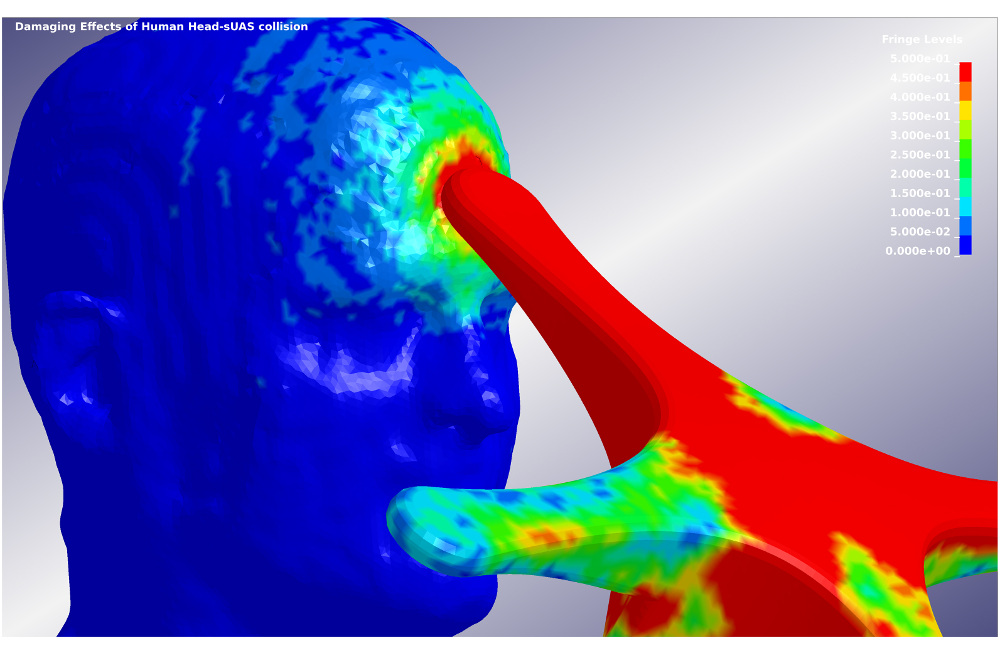MSU-led unmanned aircraft alliance investigates ground collision scenarios
 Contact: Jim Laird
Contact: Jim Laird
STARKVILLE, Miss. — The Federal Aviation Administration announced results today [April 28] from a major study to understand the risks of flying small unmanned aircraft systems (sUAS) over people, and Mississippi’s leading research university was a key contributor to the project.
Scientists at Mississippi State were charged with assessing what could happen if a drone struck a person’s head. They designed advanced, real-world simulations using supercomputing resources at the university’s High Performance Computing Collaboratory.
“We developed and validated human head-UAS computer models to determine the thresholds and severity levels for traumatic brain injury for different injury scenarios,” said Raj Prabhu, the lead investigator for the Mississippi State team and an assistant professor in the Department of Agricultural and Biological Engineering.
The MSU-led Alliance for System Safety of UAS through Research Excellence (ASSURE) conducted the peer-reviewed research that will help the FAA manage the risks posed by UAS — commonly known as drones — to the public.
“The ASSURE team has produced peer-reviewed research results for air-to-ground impact, and that will allow the FAA to regulate sUAS operations over people based on facts,” said MSU’s Marty Rogers, the director of ASSURE.
“We could not be prouder of this team, or the quality of research results we’re producing,” he said.
In 2015, the FAA designated ASSURE as its national center of excellence for UAS research and development. The consortium includes 23 of the world’s top research universities and more than 100 industry and government partners. (Learn more at ASSUREuas.org.)
Mississippi State, the University of Alabama-Huntsville, the University of Kansas and Embry-Riddle Aeronautical University contributed to the UAS Ground Collision Severity Evaluation Final Report, which FAA officials discussed during a news conference in Washington this afternoon.
According to the agency, the fundamental question researchers were trying to answer was “how big of a UAS can we fly directly over a person, and, if it does fall and hit someone, what is the risk of a serious injury?”
The Mississippi State researchers used quantifiable injury metrics — including Abbreviated Injury Standard (AIS), Gadd Severity Index (GI) and Head Impact Criterion (HIC) — to define safe and unsafe zones.
“It’s essential to understand what happens when a UAS hits a person in order to develop safer designs and materials that lower injury risk and severity should a collision occur,” Prabhu said.
The complete report is online at http://www.assureuas.org/projects/deliverables/sUASGroundCollisionReport.... Additional information is also available on the FAA website at www.faa.gov/news.
Mississippi State has a long and distinguished history in manned and unmanned aeronautics research.
Founded in 1948, the Raspet Flight Research Laboratory has a global reputation for composites research, and it has served as a start-up facility for various aerospace companies in the Gulf South’s growing Aerospace Corridor providing workspace, technical training and product assistance.
Earlier this month, the Department of Homeland Security’s Science and Technology Directorate (S&T) selected Mississippi as the new base of operations for small unmanned aircraft systems (sUAS) with another Mississippi State-led partnership set to oversee the new Small Unmanned Aircraft Systems Demonstration Range Facility.
Last fall, the State of Mississippi joined the Pan-Pacific UAS Test Range Complex — one of seven of the FAA’s UAS test sites.
For additional information about the FAA collision study, contact ASSURE Associate Director Lux Luxion at sluxion@assure.msstate.edu or (228) 688-4218.
MSU is Mississippi’s leading university, available online at www.msstate.edu.